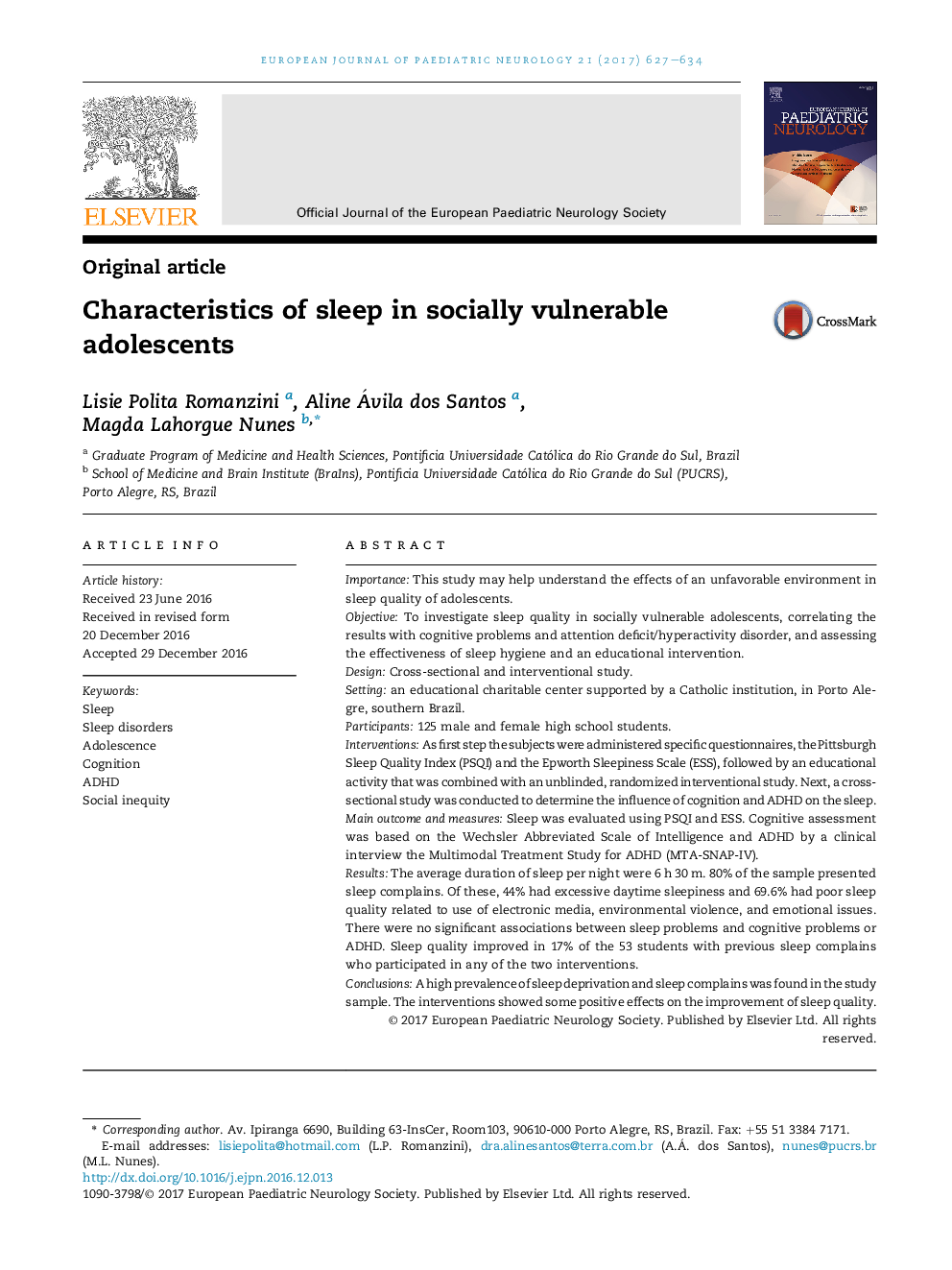| کد مقاله | کد نشریه | سال انتشار | مقاله انگلیسی | نسخه تمام متن |
|---|---|---|---|---|
| 5628800 | 1579999 | 2017 | 8 صفحه PDF | دانلود رایگان |
کلمات کلیدی
1.مقدمه
2.روش
1.2. پژوهش مقطعی
2.2.پژوهش مداخلهای
3.2. تحلیل آماری
4.2. ابعاد اخلاقی
3.نتایج
1.3. پژوهش مداخلهای
جدول 1- مشخصات جمعیتشناسی نمونه.
2.3. پژوهش مقطعی
جدول 2- اصلاح مقیاسهای اپورث و پیتسبورگ بعد از مداخله (جلسه آموزشی).
جدول 3- ویژگیهای خواب.
4.بحث
جدول 4- ارزیابی خواب- مقیاس پیتسبورگ
جدول 5- مقایسه بین امتیازهای WASI و MTA-SNAP-IV آزمودنیها با و بدون مشکلات خواب (n=111).
افشاء مالی
تعارض منافع
تقدیر و تشکر
- Socially vulnerable adolescents has high prevalence of sleep deprivation and sleep complains.
- Unfavorable environmental factors might influence sleep quality.
- Specific interventions showed some positive effects on the improvement of sleep quality.
- Educational interventions might reduce negative effects of social inequity.
ImportanceThis study may help understand the effects of an unfavorable environment in sleep quality of adolescents.ObjectiveTo investigate sleep quality in socially vulnerable adolescents, correlating the results with cognitive problems and attention deficit/hyperactivity disorder, and assessing the effectiveness of sleep hygiene and an educational intervention.DesignCross-sectional and interventional study.Settingan educational charitable center supported by a Catholic institution, in Porto Alegre, southern Brazil.Participants125 male and female high school students.InterventionsAs first step the subjects were administered specific questionnaires, the Pittsburgh Sleep Quality Index (PSQI) and the Epworth Sleepiness Scale (ESS), followed by an educational activity that was combined with an unblinded, randomized interventional study. Next, a cross-sectional study was conducted to determine the influence of cognition and ADHD on the sleep.Main outcome and measuresSleep was evaluated using PSQI and ESS. Cognitive assessment was based on the Wechsler Abbreviated Scale of Intelligence and ADHD by a clinical interview the Multimodal Treatment Study for ADHD (MTA-SNAP-IV).ResultsThe average duration of sleep per night were 6Â h 30Â m. 80% of the sample presented sleep complains. Of these, 44% had excessive daytime sleepiness and 69.6% had poor sleep quality related to use of electronic media, environmental violence, and emotional issues. There were no significant associations between sleep problems and cognitive problems or ADHD. Sleep quality improved in 17% of the 53 students with previous sleep complains who participated in any of the two interventions.ConclusionsA high prevalence of sleep deprivation and sleep complains was found in the study sample. The interventions showed some positive effects on the improvement of sleep quality.
Journal: European Journal of Paediatric Neurology - Volume 21, Issue 4, July 2017, Pages 627-634
